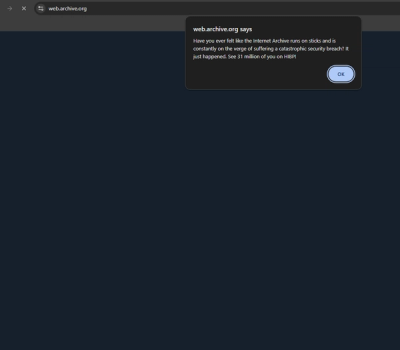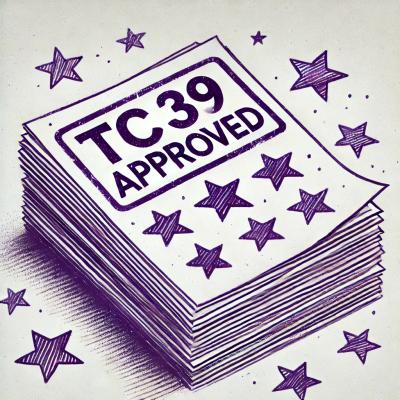
Security News
Internet Archive Hacked, 31 Million Record Compromised
The Internet Archive's "Wayback Machine" has been hacked and defaced, with 31 millions records compromised.
calimero-sdk
Advanced tools
A JavaScript library for building decentralized applications, interacting with Calimero private shards, and managing NEAR wallets.
add calimero-sdk dependency to your project.
$ npm i calimero-sdk
$ yarn add calimero-sdk
| Method | Description | Paremeters | Return |
|---|---|---|---|
| init ( config ) | Initialize a new instance of CalimeroSdk. | shardId : string calimeroUrl : string walletUrl : string calimeroWebSdkService : string | CalimeroSdk : Object |
| connect() | Connect to a Calimero private shard using NEAR wallet and near-api-js | Connection : CalimeroConnection config : CalimeroConfig |
| Method | Description | Parameters | Return |
|---|---|---|---|
| new WalletConnection ( calimero, appPrefix ) | Creates a new wallet connection instance which extends near-api-js WalletConnection | calimero : CalimeroSdk appPrefix : String | WalletConnection : WalletConnection |
| requestSignIn( successUrl ) | Connect wallet with a Calimero private shard and sync account | successUrl : SignInOptions | Promise : void |
| requestSignTransactions ( transactions, callbackUrl ) | Sign and approve requested transactions with wallet redirect | transactions : string callbackUrl : string | Promise : void |
| addFunctionKey ( contractAddress, methodNames, allowance, xApiKey ) | Create and add function call key with allocated allowance for calling contract methods inside the Calimero private shard | contractAddress : string methodNames : string[] allowance : BN xApiKey : string | Promise : void |
contractAddress : string - Address of account / contract located in the Calimero private shard.
methodName : string[] - String array of change functions available in smart contract.
allowance : BN - Amount allowed to spend with function key. BN simbolises big number (yoctoNEAR).
xApiKey : string - Calimero Auth token key. Can be created from Calimero Console token page or fetched from local storage under 'AUTH_TOKEN_KEY'.
ReactJS example with environment variables.
# calimeroSdk.js
import { CalimeroSdk } from "calimero-auth-sdk";
export default CalimeroSdk.init({
shardId: process.env.REACT_APP_CALIMERO_SHARD_ID,
walletUrl: process.env.REACT_APP_WALLET_ENDPOINT_URL,
calimeroUrl: process.env.REACT_APP_CALIMERO_ENDPOINT_URL,
calimeroWebSdkService: process.env.REACT_APP_CALIMERO_WEB_SDK_SERVICE_URL,
});
ReactJS example with environment variables.
# walletConnection.js
import { WalletConnection } from "calimero-sdk";
import calimeroSdk from "./calimeroSdk";
export const walletConnection = async () => {
const calimero = await calimeroSdk.connect();
return new WalletConnection(calimero, "calimero");
};
export default walletConnection;
# index.js
import React, { useEffect, useState } from "react";
import calimeroSdk from "./calimeroSdk";
import walletConnection from "./walletConnection";
export default function Dashboard() {
const [isSignedIn, setIsSignedIn] = useState(false);
const [calimero, setCalimero] = useState();
const [walletConnectionObject, setWalletConnectionObject] = useState();
const PrivateComponent = () => (
<div>
<button onClick={() => walletConnectionObject.signOut() }> Logout </button>
</div>
);
const PublicComponent = () => (
<div>
<button onClick={ () => walletConnectionObject.requestSignIn({}) }> Login </button>
</div>
);
useEffect(() => {
const initialiseWalletConnection = async () => {
setIsSignedIn(walletConnectionObject.isSignedIn());
};
if (walletConnectionObject) {
initialiseWalletConnection();
}
}, [walletConnectionObject]);
useEffect(() => {
const initializeCalimero = async () => {
setCalimero(calimeroSdk);
const wallet = await walletConnection();
setWalletConnectionObject(wallet);
};
if (!calimero || !walletConnectionObject) {
initializeCalimero();
}
}, [calimero, walletConnectionObject]);
return isSignedIn ? <PrivateComponent /> : <PublicComponent />;
}
This library is designed to be used in conjunction with Calimero private shards, and requires that you have a NEAR wallet with a valid key pair and access to the Calimero Console. You will also need to have a valid xApiKey to interact with the Calimero private shard.
Please refer to the Calimero documentation and Calimero examples for further information and guidance on using the Calimero SDK.
Calimero tokens are used to grant the user access to selected Calimero private shard RPC endpoints.
Calimero tokens are generated based on the user's account ID and the selected Calimero private shard ID. The token data also includes a start and expiry date. The maximum lifetime of a token is 30 days. The token data is sent to the NEAR wallet to be signed as a message, which does not require a blockchain transaction or gas usage. Once the authorization service verifies that the user's account ID has signed the message (containing token data), a Calimero Authorization Token is issued, allowing the user access to Calimero private shard RPC endpoints.
CalimeroTokenData with the required data: accountId and shardId. Duration of the token:from and to fields are optional and default to Date.now() and Date.now() + MAX_CALIMERO_TOKEN_DURATION, respectively.| Method | Description | Parameters | Return |
|---|---|---|---|
| CalimeroToken ( walletData, tokenData ) | Creates instance of Calimero Token with required wallet and token data. | walletData : walletData tokenData : CalimeroTokenData | constructor |
| CalimeroToken.isDurationValid() | Check if token has expired. | boolean | |
| CalimeroToken.isSignatureValid() | Verifies the that user's signature is valid. | boolean | |
| CalimeroToken.verify() | Verify the signed message. | boolean | |
| WalletData ( accountId, message, message, blockId, publicKey, signature ) | Creates an instance of WalletData with data obtained from the NEAR wallet. | accountId : string message : string blockId: string publicKey : string signature : string | constructor |
| WalletData.isSignatureValid() | Verifies that the user's signature is valid. | boolean | |
| CalimeroTokenData ( accountId, shardId, from, to ) | Creates an instance of Calimero Token Data. | accountId : string shardId : string from (optional) : Date to (optional) : Date | constructor |
| CalimeroTokenData.isDurationValid() | Checks if the expiry time is between 0 and 30 days. | boolean |
This repository is distributed under the terms of both the MIT license and the Apache License (Version 2.0). See LICENSE and LICENSE-APACHE for details.
FAQs
Javascript library to interact with Calimero private shards
The npm package calimero-sdk receives a total of 1 weekly downloads. As such, calimero-sdk popularity was classified as not popular.
We found that calimero-sdk demonstrated a not healthy version release cadence and project activity because the last version was released a year ago. It has 2 open source maintainers collaborating on the project.
Did you know?

Socket for GitHub automatically highlights issues in each pull request and monitors the health of all your open source dependencies. Discover the contents of your packages and block harmful activity before you install or update your dependencies.

Security News
The Internet Archive's "Wayback Machine" has been hacked and defaced, with 31 millions records compromised.

Security News
TC39 is meeting in Tokyo this week and they have approved nearly a dozen proposals to advance to the next stages.

Security News
Our threat research team breaks down two malicious npm packages designed to exploit developer trust, steal your data, and destroy data on your machine.